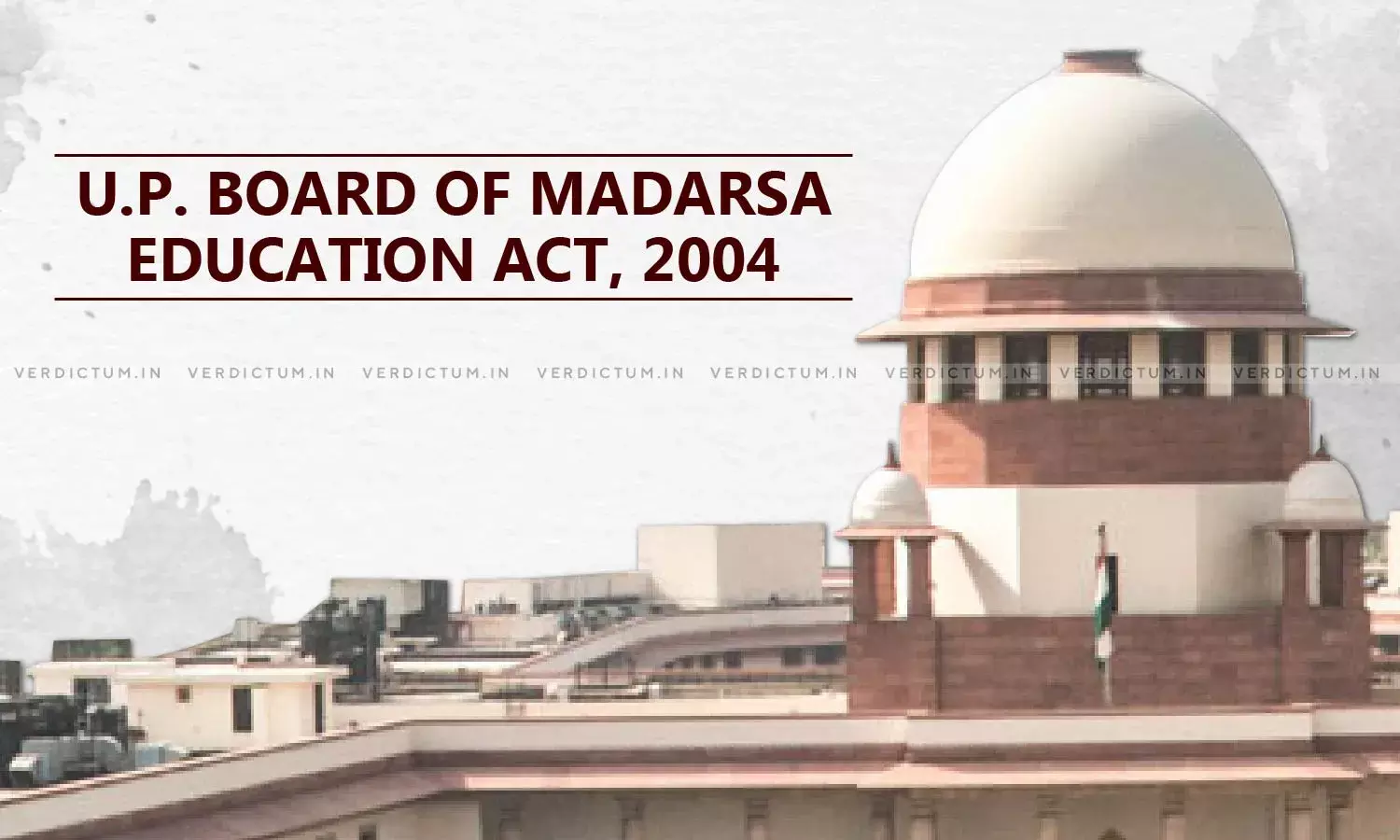Breaking| Prima Facie High Court Misconstrued Provisions: Apex Court Stays Allahabad HC's Judgment Declaring U.P. Board Of Madarsa Education Act Unconstitutional
The Supreme Court has stayed the Allahabad High Court's Judgment that declared the 'UP Board of Madarsa Education Act 2004' as unconstitutional.
The Bench headed by Chief Justice D.Y. Chandrachud, also comprising Justice J.B. Pardiwala and Justice Manoj Misra, issued notice in the Special Leave Petition (SLP) and scheduled it for final hearing in second week of July.
Senior Advocates Abhishek Manu Singhvi, Mukul Rohatgi, Huzefa Ahmadi, Salman Khurshid and Menaka Guruswamy appeared for the Petitioners; Attorney General of India (AG) R Venkataramani and Additional Solicitor General (ASG) K.M. Nataraj, appeared for the Union of India.
At the outset, Singhvi submitted, "Look at the reasoning of the High Court to allow locus of the petitioner...17 lacs students will suffer, status quo has continued for one century, see the reasoning..this is the position of a 120-year-old Code (original code of 1908)." He contended that the High Court says that if you are teaching religion in any subject, it amounts to imparting religious instruction, which is against secularism. He referred to Aruna Roy's Case reported in 2002 7 SCC. "17 lakh students and 10,000 teachers cannot be absorbed," Singhvi argued.
Rohatgi contended, "These institutions teach a variety of subjects; as Mr. Singhvi said, some are state schools, some are private; the intention here is that one which is wholly aided by the state—no religious instruction." He submitted that the teaching of the Quran is itself a subject.
Ahmadi argued, "Religious subject and religious instruction are different; the expression under Entry 25 does not eschew religious education; the common thread is that any regulations on religious institutions is opposed to secularism; therefore, the consequences are drastic, my Lords!"
The CJI asked the UP government, "Should we take it that the state has defended the law in the High Court."
ASG Nataraj responded, "We had defended, but after the High Court has struck down the legislation, we accept the judgment. These students can be accommodated in the regular schools. There will be no problem for any of these students in these schools," the ASG submitted.
"As far as the present academic year is concerned, it has come to an end...as far as the Act is concerned. Madarsas can be run; we are not stopping them. Only the Act has been struck down," he added. The ASG further submitted that the State will not bear the cost.
AG Venkataramani submitted, "Entanglement of religion is the suspect issue in any degree, whatsoever, the question is not what is a tolerable degree; the court may only debate that, in consequence, the act is struck down, and the schools are not paralysed...the High Court is not entirely wrong."
Taking note of the submissions, the Bench noted that the Petitioners have also challenged Sections 1(5) and 2 Of Free and Compulsory Education Act of 2012. The Court said, "Division Bench of High Court held (1) Act of 2004 is ultra vires and unconstitutional; (2) State govt shall take steps in accommodating students in regular schools under primary, high and intermediate education boards of that state of UP. The correctness of the judgement is in question. The High Court comes to the conclusion that the Act violated the principles of Secularism and Article 21 and 21A of the Constitution."
The Bench noted that no Madarsas are being shut down by the State government. "As a matter of fact, the course of instruction provided for in the Madarsas does not include broad based education in the subjects of science, math, and social studies. The study into the secular subjects is made optional," it noted.
"We are of the view that the issues that have been raised in the SLP merit closer reflection. Therefore, we are inclined to issue notice," the Bench ordered.
The Court further ordered, "As regards the question of interim relief: (1) the High Court concludes that the 2004 Act violates the principle of secularism which underlie the basic structure of the Constitution and offends Articles 14, 19, 21, 21A; (2) the object and purpose of the 2004 Act is to provide for the establishment of a board for madrasa education in State. The definition of the expression Madarsa Education is contained in U/s 2(h) of the Statute means education in Urdu, Arabic, Islamic studies, philosophy, and such other branches specified by board."
The Bench said that while striking down the Madarsa Act of 2004, the High Court, prima facie, has misconstrued the provisions of the Act. "The Act per se does not provide for a religious instruction in an educational institution maintained out of State funds. The object and purpose of the statutory provisions is regulatory in character," the Court said.
Consequently, the Court stayed the relocation of 17 lakh students and 10,000 Madarsa teachers to regular schools in State of UP.
Pertinently, on March 22, the Allahabad High Court had declared the U.P. Board of Madarsa Education Act, 2004 unconstitutional, holding that the State has no power to create a Board for religious education or to establish a Board for school education only for a particular religion and philosophy associated with it.
The Court had observed that the very object and purpose of the U.P. Board of Madarsa Education Act (Madarsa Act) was violative of the principles of secularism and, thus, violative of the Constitution of India. Accordingly, “any such action on part of State violates the principles of secularism, which is in the letter and spirit of the Constitution of India. The same also violates Article 14 of the Constitution of India, which provides for equal treatment to every person by the State,” the Court had held.
Cause Title: Anjum Kadari and Anr. v. Union of India and Ors. [Diary No. 14432-2024]




